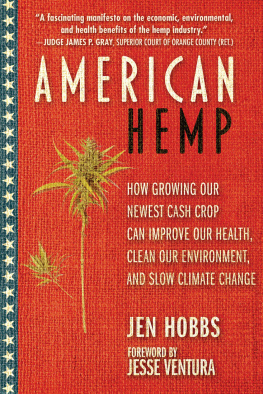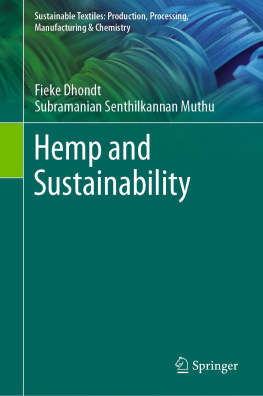Publication of this volume was made possible in part by a grant from the National Endowment for the Humanities.
Copyright 1951 by University of Kentucky Press Foreword and Updated Bibliography Copyright 1998 by The University Press of Kentucky
Scholarly publisher for the Commonwealth, serving Bellarmine University, Berea College, Centre College of Kentucky, Eastern Kentucky University, The Filson Historical Society, Georgetown College, Kentucky Historical Society, Kentucky State University, Morehead State University, Murray State University, Northern Kentucky University, Transylvania University, University of Kentucky, University of Louisville, and Western Kentucky University. All rights reserved.
Editorial and Sales Offices: The University Press of Kentucky
663 South Limestone Street, Lexington, Kentucky 40508-4008
www.kentuckypress.com
Library of Congress Cataloging-in-Publication Data
Hopkins, James F.
A history of the hemp industry in Kentucky / James F. Hopkins.
p.cm.
Includes bibliographical references and index.
ISBN 0-8131-0930-2 (alk. paper)
1. Hemp industryKentuckyHistory. I. Title.
HD9155.U5K451998
338.1735309769dc2197-31101
ISBN 978-0-8131-0930-5
This book is printed on acid-free recycled paper meeting the requirements of the American National Standard for Permanence in Paper for Printed Library Materials.
Manufactured in the United States of America.
| Member of the Association of
American University Presses |
CONTENTS
Foreword
Preface
Introduction
I.The Hemp Farm
II.Management and Sale of the Crop
III.Prices and Production to 1861
IV.Manufacturing to 1861
V.Production of Hemp for Marine Use
VI.The Decline of the Industry
Bibliographical Note
Updated Bibliography
Index
Illustrations follow page 48
FOREWORD
PARADOXICALLY, there has lingered over the history of hemp growing in Kentucky an aura of romance and at the same time a cloud of evil. Except for the history of tobacco, no other Kentucky field crop has undergone so many frustrating turns of fortune, or come under such intensive scrutiny. In recent years, and in an era when Kentucky farmers are seeking so diligently for an alternative cash crop to tobacco, some attention has been focused on a renewal of hemp production. Proponents in Kentucky, Missouri, Colorado, and possibly other states have sought legislative sanctions to grow hemp. Some have suggested the crop would eliminate weeds, enrich soils, and lead to the possible discovery of new and as yet unidentified products. The new proposals to legalize the growing of hemp in Kentucky assume some complex social, legal, and economic considerations if not outright barriers.
Up to the close of the 1930s, no Kentucky state or local historian had undertaken the necessary research or the writing of an objective history of hemp growing in Kentucky. Earlier historians gave only slight attention to the subject, if they mentioned it at all. For instance, Richard H. Collins gave more space in his two-volume history to the killing of a huge rattlesnake in Bullitt County than to hemp. Tangentially, James Lane Allen cast a gossamer of romance over the subject in his novel Reign of Law. Contemporary newspapers published only brief notices and advertisements on the subject.
A candidate for a masters degree in history at the University of Kentucky in 1936, James F. Hopkins set out to close this important gap in the history of Kentucky agriculture. At that date, the subject had relevance because the cultivation, processing, and marketing of hempen fiber was in a closing phase of its history. Too, the production of hemp historically bore a close relationship to the economic, social, and political history of the Commonwealth.
The growing of hemp had a tradition reaching back to the opening of the Kentucky frontier itself. Hemp seeds were among the baggage brought westward by pioneer settlers. The opening decade of the nineteenth century was an opportune era for the Kentucky hemp producers. This was also the time when the production of cotton was being expanded rapidly in the Old Southwest, and this opened a potentially rich market for hemp farmers in the production of cotton bale rope and bagging instead of cotton materials.
Later as a doctoral candidate at Duke University Hopkins expanded his study of the hemp industry, and the result was the basic text from which this book grew. No other Kentucky field crop, with the exception of tobacco, became involved in so many issues. As Hopkins noted in his introduction to this book, the crop was a mainstay of slavery in Kentucky, and conversely slavery was a mainstay of hemp growing and processing. No other Kentucky agricultural crop was so dependent upon such specialized markets as hemp. Added to this was the fact that its economic feasibility was so dependent on finding a stable market, a favoring political climate, and relative freedom from competing fibers.
The production of hemp, and the processing of its fiber, was always a labor-intensive operation. Every phase of its production, planting, cutting, breaking, and fabrication, required the use of intensive physical labor. The cutting, shocking, rotting, and breaking of the crop were arduous tasks, as was the conversion of the fiber into cotton bagging, coarse fabrics, and bale rope. Throughout the nineteenth century there were only limited mechanical devices for the processing of hemp. When Hopkins began his research, there remained only a limited number of hemp farmers in the Central Bluegrass counties. He did have an opportunity to see the processes of field production. Hemp growing in 1935 was no less laborious than it had been in 1835.
Then, in the late 1930s there appeared a slight suspicion that the hemp plant had a narcotic or mind-altering chemical property. Soon after World War II the Federal Bureau of Investigation appealed to the Department of History at the University of Kentucky to supply possible information about the smoking of hemp blooms and leaves in earlier years. There seemed to have been some on the parts of slaves, and later field laborers. A case of a slave smoking hemp in the neighborhood of Owensboro could be documented, but there was a vagueness about other instances.
No library or archival depository in Kentucky in 1940 contained more than a scattering of primary documentary materials relating to the growing of hemp in the state. No one had investigated the rich lodes of information contained in estate settlement inventories deposited in county clerk offices. The legislative journals and Acts of the Kentucky General Assembly contain only scattered bits of information, as Adelaide Hasse indicated in the Kentucky section of her












